- Home
- George Orwell
1984 Page 3
1984 Read online
Page 3
'Of course if Tom was home he'd put it right in a moment,' she said. 'He loves anything like that. He's ever so good with his hands, Tom is.'
Parsons was Winston's fellow-employee at the Ministry of Truth. He was a fattish but active man of paralysing stupidity, a mass of imbecile enthusiasms — one of those completely unquestioning, devoted drudges on whom, more even than on the Thought Police, the stability of the Party depended. At thirty-five he had just been unwillingly evicted from the Youth League, and before graduating into the Youth League he had managed to stay on in the Spies for a year beyond the statutory age. At the Ministry he was employed in some subordinate post for which intelligence was not required, but on the other hand he was a leading figure on the Sports Committee and all the other committees engaged in organizing community hikes, spontaneous demonstrations, savings campaigns, and voluntary activities generally. He would inform you with quiet pride, between whiffs of his pipe, that he had put in an appearance at the Community Centre every evening for the past four years. An overpowering smell of sweat, a sort of unconscious testimony to the strenuousness of his life, followed him about wherever he went, and even remained behind him after he had gone.
'Have you got a spanner? -said Winston, fiddling with the nut on the angle-joint.
'A spanner,' said Mrs Parsons, immediately becoming invertebrate. 'I don't know, I'm sure. Perhaps the children -'
There was a trampling of boots and another blast on the comb as the children charged into the living-room. Mrs Parsons brought the spanner. Winston let out the water and disgustedly removed the clot of human hair that had blocked up the pipe. He cleaned his fingers as best he could in the cold water from the tap and went back into the other room.
'Up with your hands!' yelled a savage voice.
A handsome, tough-looking boy of nine had popped up from behind the table and was menacing him with a toy automatic pistol, while his small sister, about two years younger, made the same gesture with a fragment of wood. Both of them were dressed in the blue shorts, grey shirts, and red neckerchiefs which were the uniform of the Spies. Winston raised his hands above his head, but with an uneasy feeling, so vicious was the boy's demeanour, that it was not altogether a game.
'You're a traitor!' yelled the boy. 'You're a thought-criminal! You're a Eurasian spy! I'll shoot you, I'll vaporize you, I'll send you to the salt mines!'
Suddenly they were both leaping round him, shouting 'Traitor!' and 'Thought-criminal!' the little girl imitating her brother in every movement. It was somehow slightly frightening, like the gambolling of tiger cubs which will soon grow up into man-eaters. There was a sort of calculating ferocity in the boy's eye, a quite evident desire to hit or kick Winston and a consciousness of being very nearly big enough to do so. It was a good job it was not a real pistol he was holding, Winston thought.
Mrs Parsons' eyes flitted nervously from Winston to the children, and back again. In the better light of the living-room he noticed with interest that there actually was dust in the creases of her face.
'They do get so noisy,' she said. 'They're disappointed because they couldn't go to see the hanging, that's what it is. I'm too busy to take them. and Tom won't be back from work in time.'
'Why can't we go and see the hanging?' roared the boy in his huge voice.
'Want to see the hanging! Want to see the hanging!' chanted the little girl, still capering round.
Some Eurasian prisoners, guilty of war crimes, were to be hanged in the Park that evening, Winston remembered. This happened about once a month, and was a popular spectacle. Children always clamoured to be taken to see it. He took his leave of Mrs Parsons and made for the door. But he had not gone six steps down the passage when something hit the back of his neck an agonizingly painful blow. It was as though a red-hot wire had been jabbed into him. He spun round just in time to see Mrs Parsons dragging her son back into the doorway while the boy pocketed a catapult.
'Goldstein!' bellowed the boy as the door closed on him. But what most struck Winston was the look of helpless fright on the woman's greyish face.
Back in the flat he stepped quickly past the telescreen and sat down at the table again, still rubbing his neck. The music from the telescreen had stopped. Instead, a clipped military voice was reading out, with a sort of brutal relish, a description of the armaments of the new Floating Fortress which had just been anchored between lceland and the Faroe lslands.
With those children, he thought, that wretched woman must lead a life of terror. Another year, two years, and they would be watching her night and day for symptoms of unorthodoxy. Nearly all children nowadays were horrible. What was worst of all was that by means of such organizations as the Spies they were systematically turned into ungovernable little savages, and yet this produced in them no tendency whatever to rebel against the discipline of the Party. On the contrary, they adored the Party and everything connected with it. The songs, the processions, the banners, the hiking, the drilling with dummy rifles, the yelling of slogans, the worship of Big Brother — it was all a sort of glorious game to them. All their ferocity was turned outwards, against the enemies of the State, against foreigners, traitors, saboteurs, thought-criminals. It was almost normal for people over thirty to be frightened of their own children. And with good reason, for hardly a week passed in which The Times did not carry a paragraph describing how some eavesdropping little sneak — 'child hero' was the phrase generally used — had overheard some compromising remark and denounced its parents to the Thought Police.
The sting of the catapult bullet had worn off. He picked up his pen half-heartedly, wondering whether he could find something more to write in the diary. Suddenly he began thinking of O'Brien again.
Years ago — how long was it? Seven years it must be — he had dreamed that he was walking through a pitch-dark room. And someone sitting to one side of him had said as he passed: 'We shall meet in the place where there is no darkness.' It was said very quietly, almost casually — a statement, not a command. He had walked on without pausing. What was curious was that at the time, in the dream, the words had not made much impression on him. It was only later and by degrees that they had seemed to take on significance. He could not now remember whether it was before or after having the dream that he had seen O'Brien for the first time, nor could he remember when he had first identified the voice as O'Brien's. But at any rate the identification existed. It was O'Brien who had spoken to him out of the dark.
Winston had never been able to feel sure — even after this morning's flash of the eyes it was still impossible to be sure whether O'Brien was a friend or an enemy. Nor did it even seem to matter greatly. There was a link of understanding between them, more important than affection or partisanship. 'We shall meet in the place where there is no darkness,' he had said. Winston did not know what it meant, only that in some way or another it would come true.
The voice from the telescreen paused. A trumpet call, clear and beautiful, floated into the stagnant air. The voice continued raspingly:
'Attention! Your attention, please! A newsflash has this moment arrived from the Malabar front. Our forces in South India have won a glorious victory. I am authorized to say that the action we are now reporting may well bring the war within measurable distance of its end. Here is the newsflash -'
Bad news coming, thought Winston. And sure enough, following on a gory description of the annihilation of a Eurasian army, with stupendous figures of killed and prisoners, came the announcement that, as from next week, the chocolate ration would be reduced from thirty grammes to twenty.
Winston belched again. The gin was wearing off, leaving a deflated feeling. The telescreen — perhaps to celebrate the victory, perhaps to drown the memory of the lost chocolate — crashed into 'Oceania, 'tis for thee'. You were supposed to stand to attention. However, in his present position he was invisible.
'Oceania, 'tis for thee' gave way to lighter music. Winston walked over to the window, keeping his back to the telescreen. The
day was still cold and clear. Somewhere far away a rocket bomb exploded with a dull, reverberating roar. About twenty or thirty of them a week were falling on London at present.
Down in the street the wind flapped the torn poster to and fro, and the word INGSOC fitfully appeared and vanished. Ingsoc. The sacred principles of Ingsoc. Newspeak, doublethink, the mutability of the past. He felt as though he were wandering in the forests of the sea bottom, lost in a monstrous world where he himself was the monster. He was alone. The past was dead, the future was unimaginable. What certainty had he that a single human creature now living was on his side? And what way of knowing that the dominion of the Party would not endure for ever? Like an answer, the three slogans on the white face of the Ministry of Truth came back to him:
WAR IS PEACE
FREEDOM IS SLAVERY
IGNORANCE IS STRENGTH
He took a twenty-five cent piece out of his pocket. There, too, in tiny clear lettering, the same slogans were inscribed, and on the other face of the coin the head of Big Brother. Even from the coin the eyes pursued you. On coins, on stamps, on the covers of books, on banners, on posters, and on the wrappings of a cigarette Packet — everywhere. Always the eyes watching you and the voice enveloping you. Asleep or awake, working or eating, indoors or out of doors, in the bath or in bed — no escape. Nothing was your own except the few cubic centimetres inside your skull.
The sun had shifted round, and the myriad windows of the Ministry of Truth, with the light no longer shining on them, looked grim as the loopholes of a fortress. His heart quailed before the enormous pyramidal shape. It was too strong, it could not be stormed. A thousand rocket bombs would not batter it down. He wondered again for whom he was writing the diary. For the future, for the past — for an age that might be imaginary. And in front of him there lay not death but annihilation. The diary would be reduced to ashes and himself to vapour. Only the Thought Police would read what he had written, before they wiped it out of existence and out of memory. How could you make appeal to the future when not a trace of you, not even an anonymous word scribbled on a piece of paper, could physically survive?
The telescreen struck fourteen. He must leave in ten minutes. He had to be back at work by fourteen-thirty.
Curiously, the chiming of the hour seemed to have put new heart into him. He was a lonely ghost uttering a truth that nobody would ever hear. But so long as he uttered it, in some obscure way the continuity was not broken. It was not by making yourself heard but by staying sane that you carried on the human heritage. He went back to the table, dipped his pen, and wrote:
To the future or to the past, to a time when thought is free, when men are different from one another and do not live alone — to a time when truth exists and what is done cannot be undone: From the age of uniformity, from the age of solitude, from the age of Big Brother, from the age of doublethink — greetings!
He was already dead, he reflected. It seemed to him that it was only now, when he had begun to be able to formulate his thoughts, that he had taken the decisive step. The consequences of every act are included in the act itself. He wrote:
Thoughtcrime does not entail death: thoughtcrime IS death.
Now he had recognized himself as a dead man it became important to stay alive as long as possible. Two fingers of his right hand were inkstained. It was exactly the kind of detail that might betray you. Some nosing zealot in the Ministry (a woman, probably: someone like the little sandy-haired woman or the dark-haired girl from the Fiction Department) might start wondering why he had been writing during the lunch interval, why he had used an oldfashioned pen, what he had been writing — and then drop a hint in the appropriate quarter. He went to the bathroom and carefully scrubbed the ink away with the gritty dark-brown soap which rasped your skin like sandpaper and was therefore well adapted for this purpose.
He put the diary away in the drawer. It was quite useless to think of hiding it, but he could at least make sure whether or not its existence had been discovered. A hair laid across the page-ends was too obvious. With the tip of his finger he picked up an identifiable grain of whitish dust and deposited it on the corner of the cover, where it was bound to be shaken off if the book was moved.
Chapter 3
Winston was dreaming of his mother.
He must, he thought, have been ten or eleven years old when his mother had disappeared. She was a tall, statuesque, rather silent woman with slow movements and magnificent fair hair. His father he remembered more vaguely as dark and thin, dressed always in neat dark clothes (Winston remembered especially the very thin soles of his father's shoes) and wearing spectacles. The two of them must evidently have been swallowed up in one of the first great purges of the fifties.
At this moment his mother was sitting in some place deep down beneath him, with his young sister in her arms. He did not remember his sister at all, except as a tiny, feeble baby, always silent, with large, watchful eyes. Both of them were looking up at him. They were down in some subterranean place — the bottom of a well, for instance, or a very deep grave — but it was a place which, already far below him, was itself moving downwards. They were in the saloon of a sinking ship, looking up at him through the darkening water. There was still air in the saloon, they could still see him and he them, but all the while they were sinking down, down into the green waters which in another moment must hide them from sight for ever. He was out in the light and air while they were being sucked down to death, and they were down there because he was up here. He knew it and they knew it, and he could see the knowledge in their faces. There was no reproach either in their faces or in their hearts, only the knowledge that they must die in order that he might remain alive, and that this was part of the unavoidable order of things.
He could not remember what had happened, but he knew in his dream that in some way the lives of his mother and his sister had been sacrificed to his own. It was one of those dreams which, while retaining the characteristic dream scenery, are a continuation of one's intellectual life, and in which one becomes aware of facts and ideas which still seem new and valuable after one is awake. The thing that now suddenly struck Winston was that his mother's death, nearly thirty years ago, had been tragic and sorrowful in a way that was no longer possible. Tragedy, he perceived, belonged to the ancient time, to a time when there was still privacy, love, and friendship, and when the members of a family stood by one another without needing to know the reason. His mother's memory tore at his heart because she had died loving him, when he was too young and selfish to love her in return, and because somehow, he did not remember how, she had sacrificed herself to a conception of loyalty that was private and unalterable. Such things, he saw, could not happen today. Today there were fear, hatred, and pain, but no dignity of emotion, no deep or complex sorrows. All this he seemed to see in the large eyes of his mother and his sister, looking up at him through the green water, hundreds of fathoms down and still sinking.
Suddenly he was standing on short springy turf, on a summer evening when the slanting rays of the sun gilded the ground. The landscape that he was looking at recurred so often in his dreams that he was never fully certain whether or not he had seen it in the real world. In his waking thoughts he called it the Golden Country. It was an old, rabbit-bitten pasture, with a foot-track wandering across it and a molehill here and there. In the ragged hedge on the opposite side of the field the boughs of the elm trees were swaying very faintly in the breeze, their leaves just stirring in dense masses like women's hair. Somewhere near at hand, though out of sight, there was a clear, slow-moving stream where dace were swimming in the pools under the willow trees.
The girl with dark hair was coming towards them across the field. With what seemed a single movement she tore off her clothes and flung them disdainfully aside. Her body was white and smooth, but it aroused no desire in him, indeed he barely looked at it. What overwhelmed him in that instant was admiration for the gesture with which she had thrown her clothes aside. With its grace
and carelessness it seemed to annihilate a whole culture, a whole system of thought, as though Big Brother and the Party and the Thought Police could all be swept into nothingness by a single splendid movement of the arm. That too was a gesture belonging to the ancient time. Winston woke up with the word 'Shakespeare' on his lips.
The telescreen was giving forth an ear-splitting whistle which continued on the same note for thirty seconds. It was nought seven fifteen, getting-up time for office workers. Winston wrenched his body out of bed — naked, for a member of the Outer Party received only 3,000 clothing coupons annually, and a suit of pyjamas was 600 — and seized a dingy singlet and a pair of shorts that were lying across a chair. The Physical Jerks would begin in three minutes. The next moment he was doubled up by a violent coughing fit which nearly always attacked him soon after waking up. It emptied his lungs so completely that he could only begin breathing again by lying on his back and taking a series of deep gasps. His veins had swelled with the effort of the cough, and the varicose ulcer had started itching.
'Thirty to forty group!' yapped a piercing female voice. 'Thirty to forty group! Take your places, please. Thirties to forties!'
Winston sprang to attention in front of the telescreen, upon which the image of a youngish woman, scrawny but muscular, dressed in tunic and gym-shoes, had already appeared.
'Arms bending and stretching!' she rapped out. 'Take your time by me. One, two, three, four! One, two, three, four! Come on, comrades, put a bit of life into it! One, two, three, four! One, two, three, four! ...'

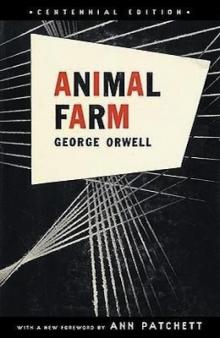 Animal Farm & 1984
Animal Farm & 1984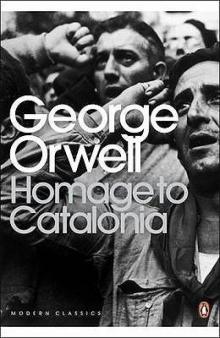 Homage to Catalonia
Homage to Catalonia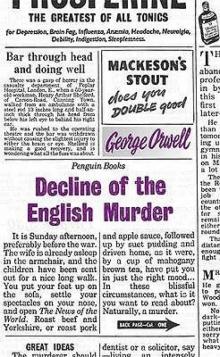 Decline of the English Murder
Decline of the English Murder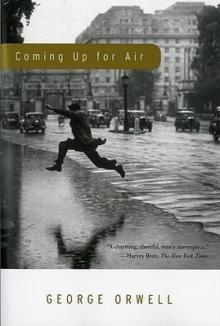 Coming Up for Air
Coming Up for Air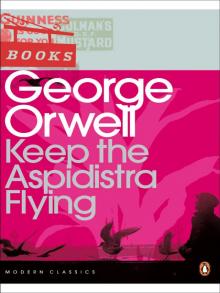 Keep the Aspidistra Flying
Keep the Aspidistra Flying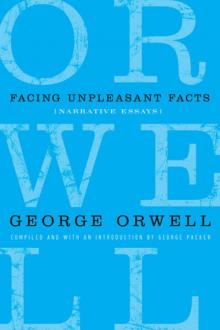 Facing Unpleasant Facts: Narrative Essays
Facing Unpleasant Facts: Narrative Essays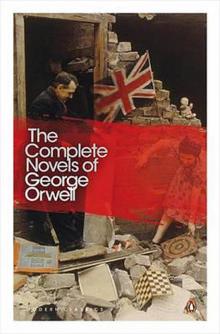 The Complete Novels of George Orwell
The Complete Novels of George Orwell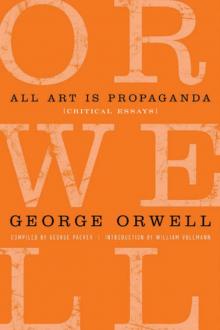 All Art Is Propaganda: Critical Essays
All Art Is Propaganda: Critical Essays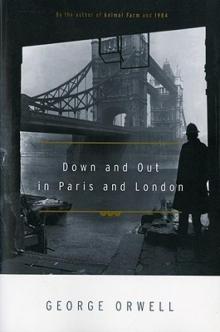 Down and Out in Paris and London
Down and Out in Paris and London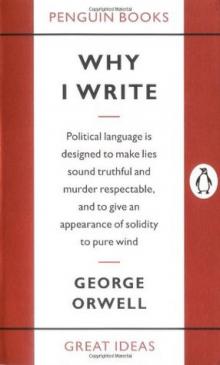 Why I Write
Why I Write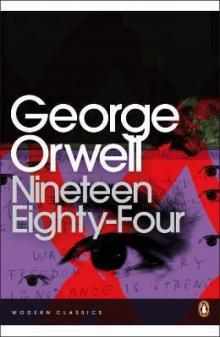 Nineteen Eighty-Four
Nineteen Eighty-Four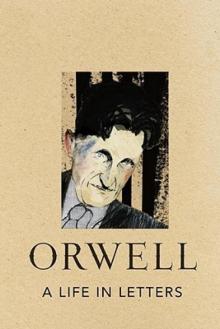 A Life in Letters
A Life in Letters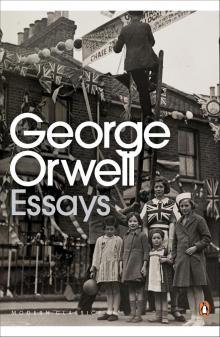 Essays
Essays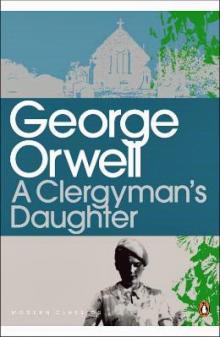 A Clergyman's Daughter
A Clergyman's Daughter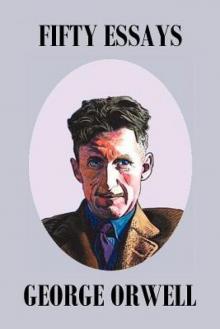 Fifty Orwell Essays
Fifty Orwell Essays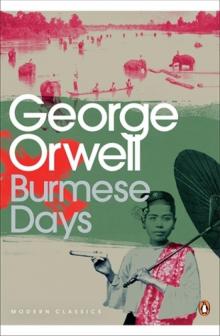 Burmese Days
Burmese Days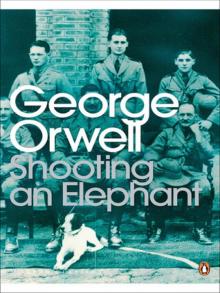 Shooting an Elephant
Shooting an Elephant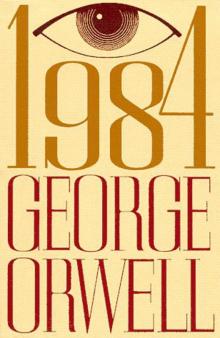 1984 (Penguin)
1984 (Penguin)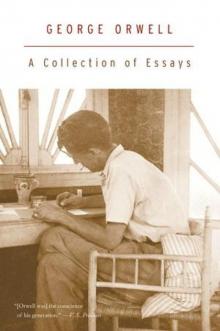 A Collection of Essays
A Collection of Essays 1984
1984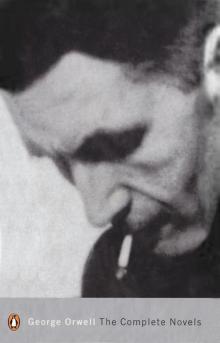 The Complete Novels
The Complete Novels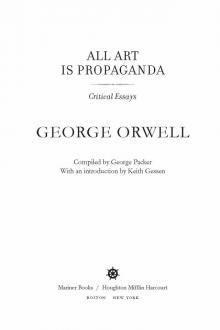 All Art Is Propaganda
All Art Is Propaganda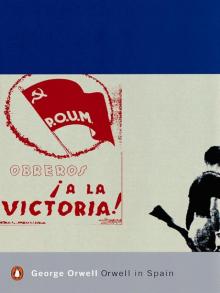 Orwell in Spain
Orwell in Spain Animal Farm: A Fairy Story
Animal Farm: A Fairy Story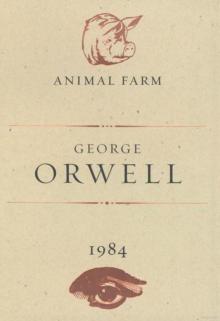 Animal Farm and 1984
Animal Farm and 1984